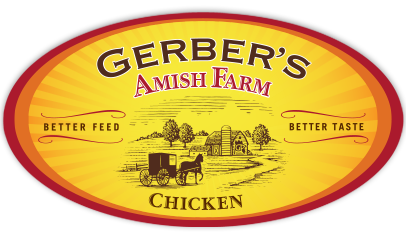FAQS
Do your chickens get much fresh air?
Yes. Our chickens are raised in both modern houses and traditional old style houses. Weatherproof curtains and tunneling system procedures ensure fresh air and natural light for chickens. It is important to maintain good flock management to ensure chickens are safe and protected from harsh weather. Whether our chickens grow in old style or new houses, our goal is to raise them safely, comfortably and on a healthy diet.
Do you give Gerber's Amish Farm Chickens antibiotics?
No. Antibiotics are never injected into our eggs, nor are they administered to our chicks, or added to the feed or water consumed by Gerber chickens at any time. Our Gerber Farm Division and our growers safeguard the health of our chickens by assuring that they have plenty of nutritious feed, water, comfortable housing and abundant care.
Do Gerber’s Amish Farm Chicken™ products contain GMOs?
Gerber Amish Farm Chicken™ products are 100% GMO-free. The meat is tested and results demonstrate that Gerber chicken meat is free of all GMOs. To verify this we send our chicken products to an independent, accredited lab for modied DNA (GMO) testing. Our results demonstrate that our chicken products are 100% GMO-free.
Are the chickens humanely raised and handled?
Yes. All Gerber chickens are raised and handled according to the strict internal guidelines established by Gerber Poultry. Our hatchery, farms, live haul operation and slaughter facility are all certified humane by an independent humane auditing group as well as by the humane certification team of a large Gerber customer. Our Farm Team and a member of the company leadership team have all been trained and certified in humane handling. One of the company requirements is that all of the family farmers, as well as anyone who handles live chickens, have been trained in humane live bird handling. Care is monitored regularly by members of the Gerber Farm team. In addition, Gerber has an auditor on staff that operates independently of the Farm Team and audits every farm at least once a year. See also the Food You Can Trust section.
What do you feed your chickens?
Corn and soybeans are used to make our specialized, antibiotic-free and vegetable-based, all natural feed. At Gerber's it's all about raising and feeding our chickens the right way, the natural way. You'll NEVER find meat or bone meal, fishmeal, bakery by-products, medicinal growth stimulants, antibiotics, hormones, or additives containing arsenic or arsenic compounds in the feed or water that we give our chickens.
Do you use growth hormones?
Chickens produced or sold in the United States contain no added or artificial hormones. However, because so many people mistakenly believe hormones are used, most chicken companies continue to include the term "no hormones". When using the term on packaging, the USDA requires all poultry companies to use the adjoining phrase: "Federal regulations do not permit the use of hormones in poultry."
Is your chicken gluten free?
Yes. This includes our tray packs of chickens, chicken burgers, and chicken sausages available for purchase at participating local grocery stores.
Does your feed contain GMO's?
The feed we purchase may or may not have the presence of GMO’s. We make this assumption since our feed manufacturer buys our corn and soy on the commodity market and because we do not purchase all 100% verified organic feed. The corn and soybeans are used to make our specialized, antibiotic free vegetable based, all natural feed. Our feed contains no artificial ingredients and no animal by-products. When our custom made feed is eaten by the chickens all traces of any modied DNA that may have been present in the corn and soy are destroyed by the chicken’s digestive system. The resulting meat is 100% GMO-free. Our chicken products are tested and verified to be GMO-free by a certified genetics lab.
What does the term "natural" mean?
According to the USDA, a product can be labeled as "natural" if it is free of artificial flavoring, coloring, chemical preservatives or other synthetic ingredients. It must also be "minimally processed.” Our chickens are beyond natural, never been given antibiotics, fed only a vegetarian diet, and are humanely raised in a stress free environment. Other conventional chicken products cannot make these claims.
What chilling process do you use?
Our chickens are chilled in a water chiller with an organic acid solution to kill pathogens. Organic acids are citric acid and acetic acid. Citric acid is the acid component of citrus fruits (think orange juice, grapefruit, etc.). Acetic acid is the acid component of vinegar. We use the vinegar-type acetic acid in solution with hydrogen peroxide; making peracetic, or peroxyacetic acid (PAA). When the PAA comes in contact with a pathogen or other organic organism it kills the organism leaving no residual chemical trace.
Why are chicken bones dark in color?
Darkening around bones occurs primarily in young chickens. Since their bones have not calcified completely, pigment from the bone marrow can seep through the porous bones. Freezing can also contribute to this seepage. When the chicken is cooked, the pigment turns dark. It is perfectly safe to eat chicken meat that turns dark during cooking.
How do I know if I am cooking the chicken long enough?
We recommend using a thermometer to ensure the chicken is cooked at the recommended temperature for safe consumption at 165 degrees. In addition to using a thermometer, visual doneness can also be verified by piercing chicken with fork with ease and making sure juices run clear.
Where are you located?
We are located in Kidron, Ohio, the heart of Ohio's Amish Country, and the largest Old Order Amish population in the world. Our farms are located within 50 miles from our corporate headquarters and processing facility. This allows us to monitor controls and maintain close relationships with our growers who care for our chickens.

